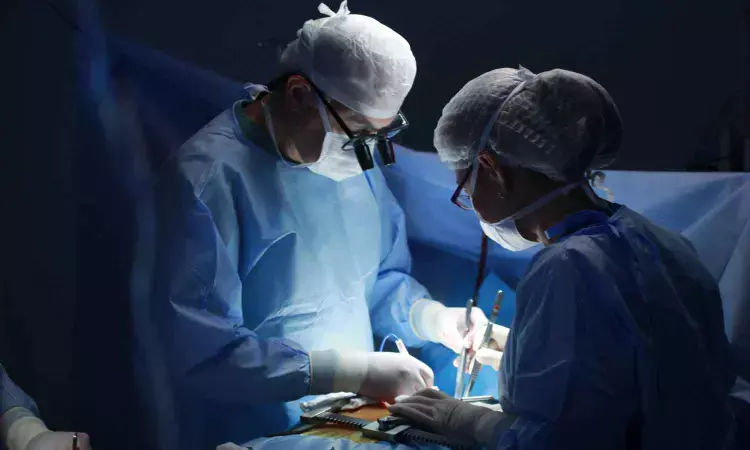- Home
- Medical news & Guidelines
- Anesthesiology
- Cardiology and CTVS
- Critical Care
- Dentistry
- Dermatology
- Diabetes and Endocrinology
- ENT
- Gastroenterology
- Medicine
- Nephrology
- Neurology
- Obstretics-Gynaecology
- Oncology
- Ophthalmology
- Orthopaedics
- Pediatrics-Neonatology
- Psychiatry
- Pulmonology
- Radiology
- Surgery
- Urology
- Laboratory Medicine
- Diet
- Nursing
- Paramedical
- Physiotherapy
- Health news
- Fact Check
- Bone Health Fact Check
- Brain Health Fact Check
- Cancer Related Fact Check
- Child Care Fact Check
- Dental and oral health fact check
- Diabetes and metabolic health fact check
- Diet and Nutrition Fact Check
- Eye and ENT Care Fact Check
- Fitness fact check
- Gut health fact check
- Heart health fact check
- Kidney health fact check
- Medical education fact check
- Men's health fact check
- Respiratory fact check
- Skin and hair care fact check
- Vaccine and Immunization fact check
- Women's health fact check
- AYUSH
- State News
- Andaman and Nicobar Islands
- Andhra Pradesh
- Arunachal Pradesh
- Assam
- Bihar
- Chandigarh
- Chattisgarh
- Dadra and Nagar Haveli
- Daman and Diu
- Delhi
- Goa
- Gujarat
- Haryana
- Himachal Pradesh
- Jammu & Kashmir
- Jharkhand
- Karnataka
- Kerala
- Ladakh
- Lakshadweep
- Madhya Pradesh
- Maharashtra
- Manipur
- Meghalaya
- Mizoram
- Nagaland
- Odisha
- Puducherry
- Punjab
- Rajasthan
- Sikkim
- Tamil Nadu
- Telangana
- Tripura
- Uttar Pradesh
- Uttrakhand
- West Bengal
- Medical Education
- Industry
Study Highlights Greater Risk of Complications from Pancreatic Fistula After Minimally Invasive Surgery

Italy: A recent study has highlighted the significant impact of postoperative pancreatic fistulas (POPF) on patient outcomes following pancreatoduodenectomy, comparing the effects of minimally invasive pancreatoduodenectomy (MIPD) versus open pancreatoduodenectomy (OPD).
The findings, published in JAMA Surgery, suggest that while MIPD has advantages in terms of recovery time and hospital stay, the occurrence of POPF presents a higher risk for additional complications in MIPD patients compared to those undergoing OPD.
Pancreatoduodenectomy, a complex surgical procedure commonly performed to treat pancreatic cancer and other conditions affecting the pancreas and duodenum, carries inherent risks, including the development of POPF. A pancreatic fistula occurs when there is an abnormal connection between the pancreas and surrounding tissues, leading to leakage of pancreatic fluids. POPF can lead to serious complications, such as infection, bleeding, and delayed recovery, which may require further interventions.
Against the above background, Caro L. Bruna, Department of General Surgery, Fondazione Poliambulanza Istituto Ospedaliero, Brescia, Italy, and colleagues aimed to evaluate the clinical impact of pancreatic fistula in patients undergoing minimally invasive pancreatoduodenectomy and open pancreatoduodenectomy.
For this purpose, the researchers conducted a cohort study from 2007 to 2020 across 36 referral centers in Europe, South America, and Asia. The study focused on patients with grade B/C pancreatic fistula (POPF) after minimally invasive pancreatoduodenectomy and OPD. Propensity score matching was performed in a 1:1 ratio based on variables including age, sex, body mass index, American Society of Anesthesiologists score, vascular involvement, neoadjuvant therapy, tumor size, malignancy, and POPF grade C.
The primary outcome was the occurrence of a second clinically relevant complication, including postpancreatic hemorrhage, delayed gastric emptying, bile leak, or chyle leak.
The investigation yielded the following findings:
- 1130 patients with pancreatic fistula (POPF) were included; 558 patients had MIPD, and 572 had OPD. After matching, 336 patients from each group were analyzed.
- The median age was 65, with 703 males (62.2%) and 427 females (37.8%).
- Among MIPD-POPF patients, 55% experienced a second complication, compared to 36% in the OPD-POPF group.
- The rate of postpancreatic hemorrhage (PPH) was higher in MIPD-POPF patients (21%) compared to OPD-POPF patients (8%).
- No significant differences were found for delayed gastric emptying (DGE), bile leak, or chyle leak between the groups.
- MIPD-POPF was associated with a longer hospital stay (27 days versus 22 days) and more reoperations (21% versus 7%), with both differences being statistically significant (P < 0.001).
- In-hospital/30-day mortality rates were similar between the two groups (7% for MIPD-POPF versus 5% for OPD-POPF).
The international multicenter study using propensity score matching conducted by the authors demonstrates that the occurrence of pancreatic fistula after minimally invasive pancreatoduodenectomy results in more severe clinical outcomes, including higher rates of post pancreatic hemorrhage, longer hospital stays, and more reoperations, compared to patients with POPF after open pancreatoduodenectomy, without increasing mortality.
"These findings emphasize the critical importance of preventing POPF and its associated complications in MIPD patients. We recommend further research to identify optimal patient selection for MIPD and to conduct randomized trials focused on mitigating POPF and PPH in this population," the researchers concluded.
Reference:
Bruna CL, Emmen AMLH, Wei K, et al. Effects of Pancreatic Fistula After Minimally Invasive and Open Pancreatoduodenectomy. JAMA Surg. Published online December 04, 2024. doi:10.1001/jamasurg.2024.5412
Dr Kamal Kant Kohli-MBBS, DTCD- a chest specialist with more than 30 years of practice and a flair for writing clinical articles, Dr Kamal Kant Kohli joined Medical Dialogues as a Chief Editor of Medical News. Besides writing articles, as an editor, he proofreads and verifies all the medical content published on Medical Dialogues including those coming from journals, studies,medical conferences,guidelines etc. Email: drkohli@medicaldialogues.in. Contact no. 011-43720751


